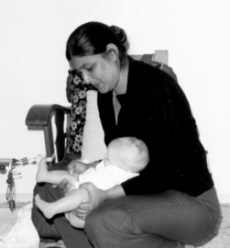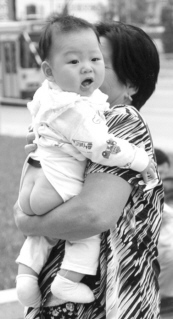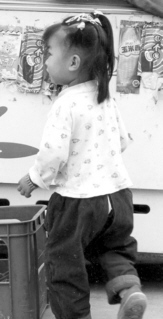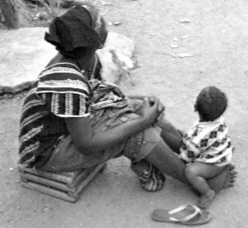|
||||
|
|
|
|||
| Home | Subscribe | Back Issues | The Organization | Volunteer | Do Something | ||||
|
||||
|
Disposing the Diaper
Part 1: Cave babies didn't need diapers. Why should we?
|
 |
|
A woman from India demonstrates the basics of holding a baby over a potty.
The same hold can be used over a toilet, even for toddlers. (Photo by Laurie Boucke, from her book Infant Potty Training) |
One very basic means of early potty training is simply taking the baby to the potty immediately after it wakes up. Babies-like adults-generally don't pee when they are sleeping. This is because your bladder largely shuts down when you are asleep. When the bladder finally gets full enough during sleep, it will signal the baby (or adult) to wake. If a caregiver is ready to take the baby to the potty as soon as it wakes, the baby can stay dry.
One crucial fact that most Americans don't realize is that baby humans-just like other baby animals-have an instinctual desire to relieve themselves in a proper place and a proper time, just like many other baby animals do. The difference with baby humans is that they are comparatively immobile. They have to be carried to the potty place.
Laurie Boucke, in her book Infant Potty Training, gives the key insight that normal American infant care essentially trains the baby to poop and pee in its diapers. The diapers become the potty place that the baby is naturally seeking. Because of this, Americans later have to retrain the kid as a toddler to do it in the toilet. Such retraining can sometimes be very difficult, and can meet a lot of resistance from some toddlers. Boucke's book has a section full of fascinating culture-by-culture accounts of early "pottying" in many different places of the world. She also has a helpful website at www.timl.com/ipt and a website to accompany her upcoming video at www.pottywhisperer.com.
  |
|
In China, babies and toddlers have traditionally worn pants with an open slit on the bottom, to facilitate rapid pottying. (Photos by Ivy Makelin, from the book Infant Potty Basics by Laurie Boucke) |
Tradition is more advanced
When I taught English language in China for two years during the 1980s, I noticed that no small babies there had diapers. Instead, babies wore pants with an open slit under the crotch. Often you could notice mothers hanging their tiny babies over the gutter, who were able to pee at the right time with rarely a serious dampening of anyone's clothes. Most American parents cannot imagine that this would be possible.
In China in that decade there was certainly no shortage of cloth for diapers. People were generally more than adequately dressed. They were simply still using traditional techniques of potty training. China's current potty habits may be quite different because of that country's increasing consumerism and exposure to commercially marketed disposable diapers, which can be viewed as "advanced" or "high status" by those who were previously not able to buy them.
The irony is that the traditional means of diaperless potty training is much more advanced, biologically, socially, and ecologically. Modern disposables are advanced in a technological sense, but are wasteful not only of resources but also of the potential of tiny human beings.
Of course there are some hygienic arguments for diaper use. American visitors to China might be distressed to see an occasional baby poop on the edge of the sidewalk. On the other hand, Chinese visiting American neighborhoods might find the commonness of dog poop equally distressing. As for baby urine, it can smell funny, but it's sterile and is not a public health concern.
However, perception of hygiene is certainly part of the reason that tiny Americans-and their parents-are increasingly stuck on diapers, even till later toddlerhood. Americans seem fairly terrified of accusations regarding unpleasant smells or natural moisture, a result of decades of TV commercials creating and then capitalizing on fear of our own biology (what do you suppose marketing efforts of anti-perspirants are based on?). Snug- fitting disposable diapers-just like waterproof "diaper covers" for cloth diapers-offer some safety from public embarrassment for commercially sensitized parents.
Surely commercialism is a root cause of the American overuse of diapers. It occurs in a number of other ways. The TV ads for diapers and disposable "pull-up" training pants are aimed at increasingly older toddlers. Other commercials depict the convenience of disposables. It's true that modern disposables have become super-absorbent, thereby absolving the caregiver of the responsibility of even checking on or touching the baby as often. Good for the caregiver? Maybe. Good for the baby? Certainly not. Babies need to be touched as often as possible. And the convenience itself is only short-term. The more dependent you become on using diapers, the longer you will be using them. It's a real drag to be changing the diapers of a three- or four-year-old.
Commercials by diaper producers can also have an effect on the information provided by commercially-sponsored mass-media. Are you likely ever to see a program on TV about "How to Raise Kids Diaperless" on a network that runs diaper commercials? Are you likely to read an article about "Doing Away with Diapers" in a parenting magazine that runs full-page ads from diaper companies? Not likely.
The models put forth by parenting magazines are quite crucial. In the absence of strong traditions, parents in our country very often turn to such magazines to find out about the basics of parenting. They generally accept the information in such magazines as being normal and good, despite the fact that these sources of information-like so many other facets of our society-are warped in sometimes very unhealthy ways by corporate interests.
Diapers and health
In the case of the overuse of diapers, "unhealthy" is not an exaggerated term. Various reasonable estimates calculate that disposable diapers make up approximately two to four percent of US garbage collection by weight. They are the third most common items in landfills, after newspapers and food/beverage containers. (See an excellent article containing this and many more facts, "The Politics of Diapers: A Timeline of Recovered History" Mothering magazine, Jan/Feb 2003 www.mothering.com/articles/new_baby/diapers/politics.html )
Cloth diapers-at least in the way that most people clean them-demand a lot of water and toxic bleach, although with a couple simple tricks it's quite easy to clean them in a much more ecologically-friendly way (see part 2 of this article in next issue).
In terms of personal health, disposable diapers-as well as cloth diapers using wool or plastic "diaper covers"-have lately been suspect. Two separate studies in 2000 and 2002 have associated higher scrotal temperatures in baby boys with disposable and covered cotton diapers, in comparison with boys in uncovered cotton diapers. Some researchers hypothesize that such higher scrotal temperatures could be a reason for the declining sperm count in males in industrialized countries. (See www.thegreenguide.com/reports/product.mhtml?id=45)
A 1999 study also showed that materials used in disposable diapers cause asthma-like respiratory problems in lab mice. That's alarming, especially since the rate of childhood asthma has been increasing in recent years. (See also the Mothering magazine article referenced above.)
In addition, diapers in general-especially disposables-could encourage passive behavior in the tot. The baby's potty needs can be met in the diaper instead of sought externally. In a way, this is a sort of artificial extension of being in the womb. I would think that this encouragement toward passivity could even inhibit mental development.
Cloth diapers-without diaper covers-are certainly better than disposables in terms of avoiding long-term use of diapers. They are more work in the short term, but I think they encourage earlier potty training for two reasons. First, because the feeling of a wet cloth diaper is somewhat uncomfortable for a kid, who then appreciates peeing elsewhere instead. Second, because cloth requires more attention from the caregiver, who will then have more reason to try bringing the kid to the potty at likely times.
 |
|
A Senegalese mother makes an impromptu outdoor potty by slightly separating her feet and letting her baby straddle them. (Photo by Alain Epelboin, from the book Infant Potty Training. |
I should mention too that cloth diapers have a long tradition in some northern climates such as Scandinavia, chiefly because of the need for clothing in colder northern climates, and the inability of parents to bring a heavily-clothed baby to the potty in time. However, with central heating in modern homes, temperature is not nearly the concern that it used to be for many. In tropical climates, there has probably never been any traditional use of diapers.
See part 2 of "Disposing the Diaper" next issue: How my wife and I potty trained pretty darn early. Our kids, I mean.
|
